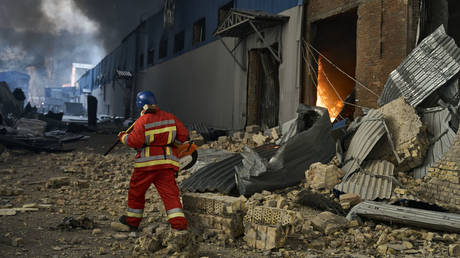ARTICLE AD BOX
Demand has spiked due to Western efforts to arm Kiev, the Swedish military chief of staff has said
The deficit of ammunition in Europe has led to inflated prices as Western nations scramble to support Ukraine in its fight against Russia, the chief of staff of the Swedish Armed Forces has said.
Speaking to Sveriges Radio national broadcaster on Tuesday, Michael Claesson said the conflict had led to a surge in demand in a very short period of time. He described the increase as “dramatic.”
“I won’t give exact figures, but we are talking about an increase of between five to ten times compared to the time before the war started,” he said, noting that it impacted not only ammunition, but also other military materiel.
According to Claesson, artillery shells for the Swedish-designed Archer 155mm self-propelled howitzer are now eight times more expensive than in 2021. He told the broadcaster that the development had been caused by a significant rearmament campaign underway both in Sweden and other European countries. “All this creates an enormous demand and competition, essentially as if people were standing in a queue.”
Read more Ukraine warns about state of air defenses
Ukraine warns about state of air defenses
Commenting on weapons procurement in late December, Swedish Defense Minister Pal Jonson admitted that his country found itself in a “difficult situation” because it had not only to support Ukraine, but also take care of its own security. As of December, Stockholm has provided Kiev with $2.2 billion in military assistance.
On Sunday, speaking online at the Society and Defense conference held in Sweden, Ukrainian President Vladimir Zelensky urged his European partners to “create an arsenal for the defense of freedom” by stepping up joint arms production.
Russian officials have repeatedly said that the Western push to arm Ukraine will only prolong the conflict while becoming a burden on ordinary taxpayers. In October, Kremlin Press Secretary Dmitry Peskov stated that “the potential of the collective West to produce munitions is limited,” saying that it would have to spend a lot of time mobilizing its resources, an effort he suggested could cause “certain points of friction.”
Meanwhile, Ukrainian Foreign Minister Dmitry Kuleba admitted last month that Kiev senses a growing “war fatigue” in the West, and acknowledged that the country’s much-hyped counteroffensive had failed to produce swift and decisive results. Moscow has described Kiev’s push as a complete fiasco, claiming that Ukraine lost some 160,000 troops over the six months of the offensive.
.png)
 1 year ago
8
1 year ago
8








 English (US)
English (US)